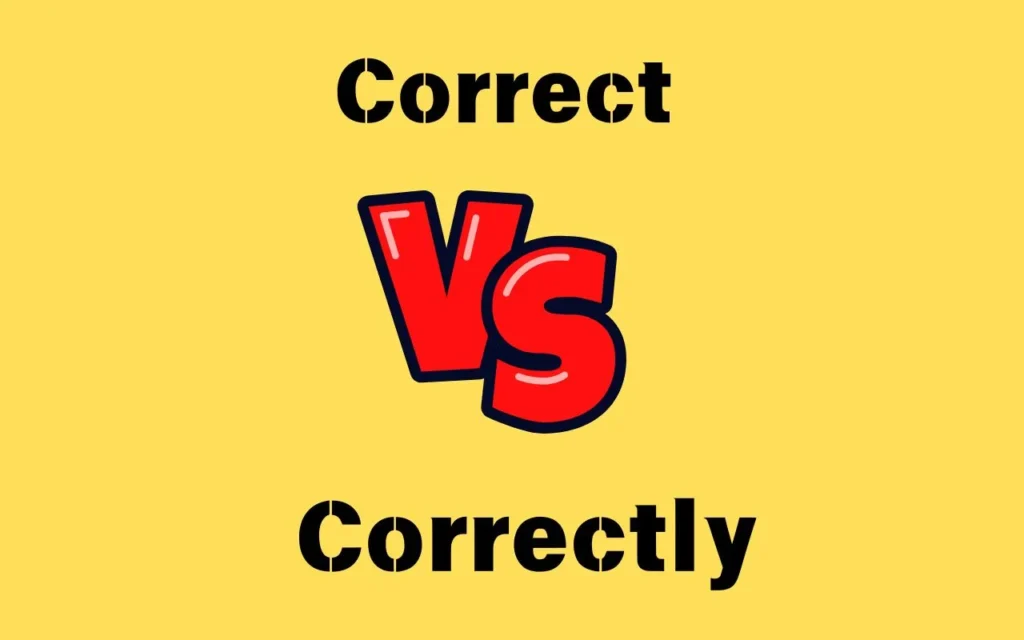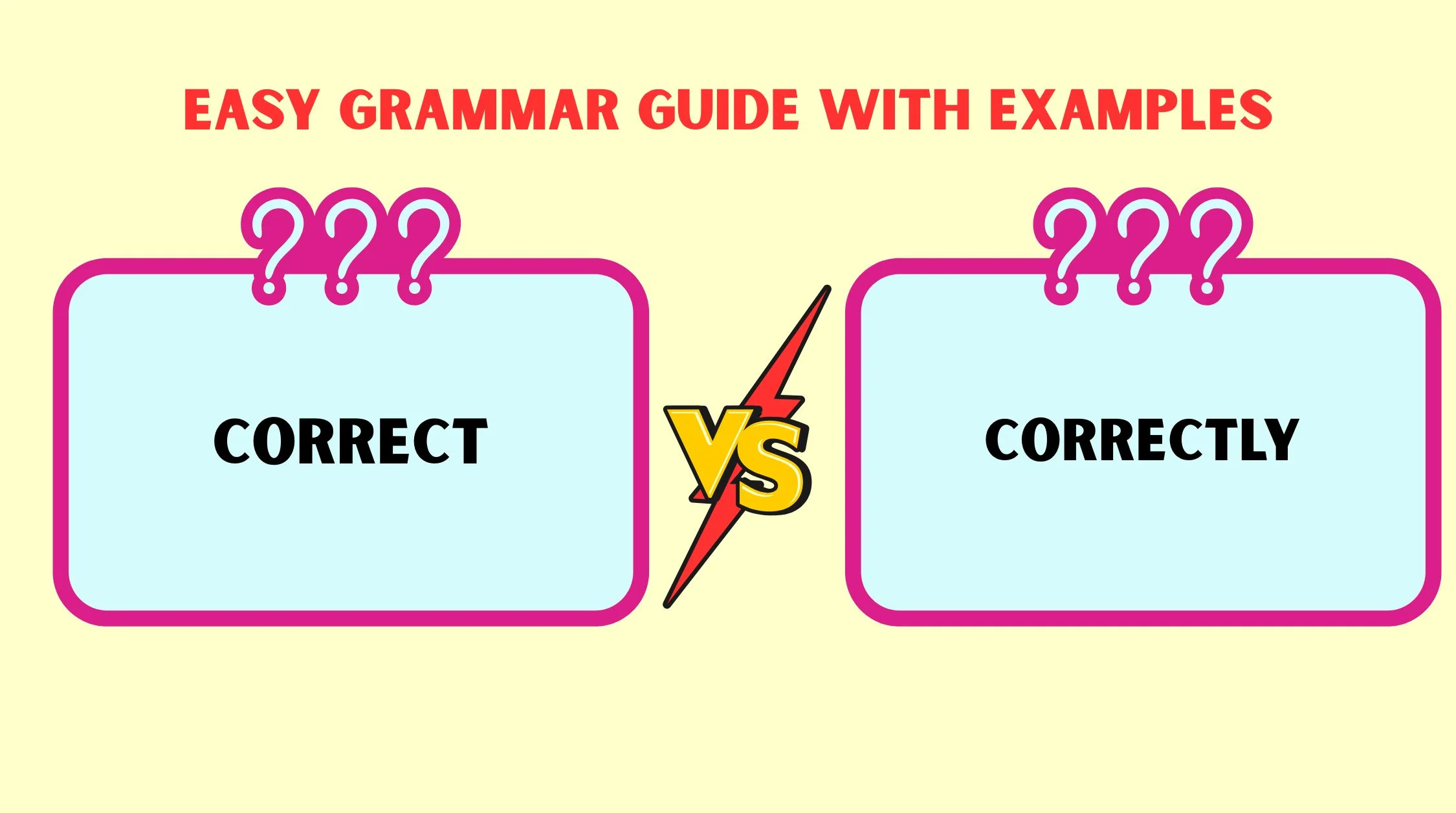Last updated on September 29th, 2025 at 10:47 am
English can be tricky. One small change in a word’s ending can completely shift its meaning. A common stumbling block for learners is the choice between “correct” and “correctly.” At first glance, they seem almost the same.
In practice, however, they serve very different grammatical functions.
In this article, we’ll dive into the actual difference between “correct” vs. “correctly.” You’ll see how to use each word properly, spot common mistakes, and learn easy memory tricks that make the choice second nature.
Understanding the Core Difference: “Correct” vs. “Correctly”

The key difference comes down to parts of speech.
- Correct is an adjective. It describes nouns.
- Correctly is an adverb. It describes verbs, adjectives, or other adverbs.
Think of it like this:
- Adjective (“correct”) → Answers “what kind?”
- Adverb (“correctly”) → Answers “how?”
Here’s a quick comparison table:
| Word | Part of Speech | What It Modifies | Example |
|---|---|---|---|
| Correct | Adjective | Noun or pronoun | That is the correct answer. |
| Correctly | Adverb | Verb, adjective, adverb | She spelled the word correctly. |
👉 Shortcut memory tip: If you’re describing a thing, use correct. If you’re describing an action, use correctly.
How to Use “Correct” in a Sentence
Since correct is an adjective, it always attaches to nouns or pronouns. You’re labeling something as accurate, appropriate, or free from mistakes.
Examples in everyday use:
- The correct answer is B.
- He followed the correct procedure.
- This is not the correct time to bring it up.
Notice how in each example, correct directly describes a noun (answer, procedure, time).
When “correct” adds nuance
The word correct doesn’t always mean “true.” It can also mean:
- Appropriate for the situation → That’s the correct attire for a wedding.
- Socially acceptable → She uses the correct form of address when writing formal letters.
Common mistake learners make
Many learners try to stick correct onto verbs, for example:
❌ You did it correct.
This feels wrong to a native speaker, because “did” is a verb, and verbs need adverbs like “correctly,” not adjectives.
How to Use “Correctly” in a Sentence
Correctly is the adverb form. It answers how an action is done.
Examples in everyday use:
- She answered the question correctly.
- He correctly identified the problem.
- Make sure you’re pronouncing it correctly.
Here, correctly modifies the verbs answered, identified, pronouncing.
Why adverbs matter
Without adverbs, sentences can sound vague. Compare:
- He spoke. (basic fact)
- He spoke correctly. (shows how he spoke — in the right way)
Common mistake learners make
Some learners overuse “correctly” when correct is better:
❌ That is correctly answer.
✔️ That is the correct answer.
Common Confusions in Real Sentences
Let’s tackle the sentences that cause the most confusion for English learners.
“I did it correct” vs. “I did it correctly”
- I did it correctly. ✅
This is grammatically right because “did” is a verb and verbs require adverbs. - I did it correct. ❌
Here “correct” is acting like an adjective, but there’s no noun to describe. It feels incomplete.
👉 Rule: When explaining how something was done, always use correctly.
“You got it correct” vs. “You got it correctly”
This one is trickier. Both look reasonable, but only one works.
- You got it correct. ✅
Why? Because “it” refers to the answer (a noun). “Correct” is describing the noun. - You got it correctly. ❌
This suggests that the action of “getting” was correct, which doesn’t fit standard grammar.
👉 Rule: When referring back to a thing (like “it”), use correct.
Quick comparison table
| Sentence | Correct or Incorrect? | Why? |
|---|---|---|
| I did it correct. | ❌ Wrong | Needs an adverb for “did.” |
| I did it correctly. | ✅ Right | “Correctly” modifies the verb. |
| You got it correct. | ✅ Right | “Correct” describes “it.” |
| You got it correctly. | ❌ Wrong | “Correctly” doesn’t fit here. |
Grammar Breakdown: What Part of Speech Is “Correctly”?
Correctly is an adverb formed by adding “-ly” to the adjective correct.
Quick rules for spotting adverbs:
- Most adverbs end in “-ly.”
- They answer how, when, where, or to what degree.
- They often sit near verbs.
Examples:
- quick → quickly
- happy → happily
- correct → correctly
Correctly specifically tells us how something was done.
Is “Correctly” Always the Right Choice?
Not always. Sometimes correct works better, depending on the sentence structure.
When to use “correct” instead of “correctly”
- With nouns: That’s the correct answer.
- After linking verbs like be, seem, appear:
- Your solution is correct.
- It seems correct to me.
When “correctly” sounds more natural
- With action verbs: She spelled it correctly.
- To emphasize method: He correctly followed the instructions.
Formal vs. casual speech
In casual English, people sometimes bend the rule:
- You did it right. (instead of “correctly”)
- That’s the right answer. (instead of “correct answer”)
👉 “Right” often replaces “correct/correctly” in everyday conversation, but in formal writing or exams, stick with “correct” and “correctly.”
Case Study: Classroom Example
Imagine a teacher grading a test:
- When she circles an answer and writes “Correct,” she’s describing the answer itself.
- When she says, “You solved the equation correctly,” she’s praising the method used.
The difference shows up clearly in real learning environments: correct = result, correctly = process.
Memory Trick to Never Forget
Think of it like baking a cake:
- If the cake is “correct,” it looks and tastes as it should.
- If you baked it correctly, you followed the recipe the right way.
👉 Result = correct.
👉 Process = correctly.
❓ FAQs
What is the difference between “correct” and “correctly”?
Correct is an adjective that describes nouns, while correctly is an adverb that describes actions.
Can I say “I did it correct”?
No. The right form is “I did it correctly” because adverbs modify verbs.
Is it right to say “You got it correct”?
Yes. In this case, “correct” describes the answer (a noun), so it’s grammatically fine.
What part of speech is “correctly”?
“Correctly” is an adverb formed from the adjective “correct.” It tells us how something was done.
Is “correctly” always better than “correct”?
Not always. Use “correct” with nouns (the correct answer) and “correctly” with verbs (she answered correctly).
Can I use “right” instead of “correctly”?
In casual English, yes. For example, you did it right. But in formal English, “correctly” is preferred.
Conclusion
The choice between correct and correctly is more than just a matter of adding “-ly.” It’s about whether you’re describing a thing or an action.
- Use correct for nouns: the correct answer, a correct method.
- Use correctly for verbs: he answered correctly, she typed it correctly.
- Remember: result = correct, process = correctly.
With practice, the distinction becomes second nature. Try writing your own examples with both words. The more you use them in context, the more natural they’ll feel.
